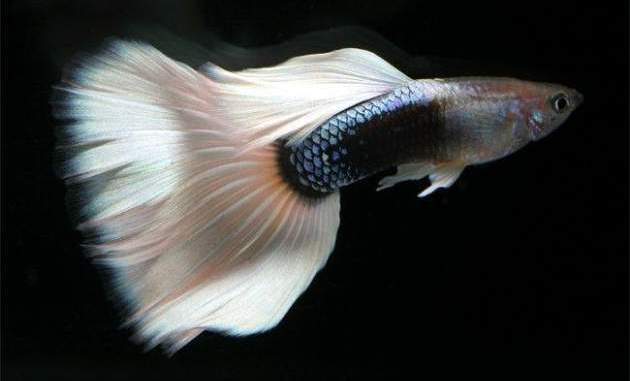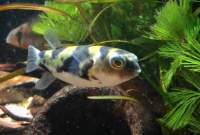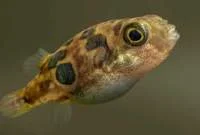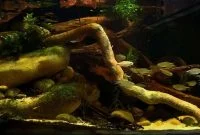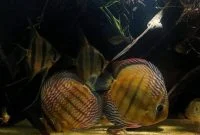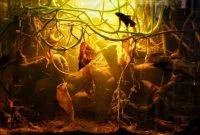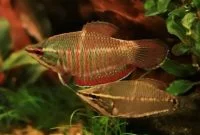Guppies are one of useful small freshwater fish due to their voracious feeding habits. Almost all types of diet variants they can swallow, including algae and any tiny peculiar creatures that potentially cause negative impacts on your aquarium populations.
Guppy is a hardy and adaptable fish species which can live in a wide of various range of environments. Furthermore, they have beautiful body patterns and colors, making these fish a perfect pet that should behave.
If we talk about algae, most fish tank keepers do not like this stuff growing in their aquarium and choose to wipe them out. Algae swiftly absorb nutrients, carbon dioxides, and oxygen; they use it to generate their population, suffering plants and suffocating fish.
This article focuses on writing on guppies and algae, talking deeper about the relationship between them. Let’s begin!
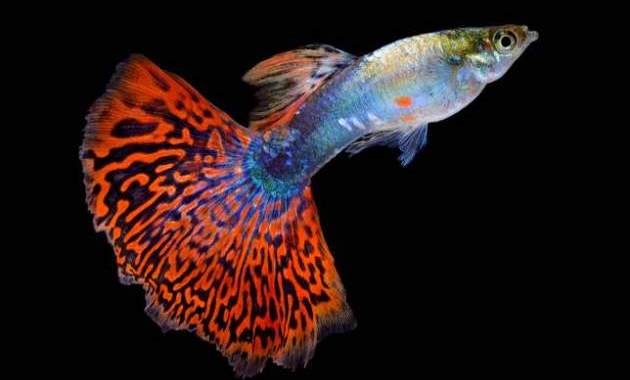
TABLE OF CONTENTS
What Are Guppies?
Guppies (Poecilia reticulata) are a member of smaller freshwater fish species belonging to the Poeciliidae family. They also have other common names that as millionfish and rainbow fish.
These little fish originate from some regions of South America, including Trinidad, Tobago, Guyana, Barbados, Venezuela, Antigua, Suriname, and Barbuda. Nowadays, they are distributed across the world and have become one of the popular small freshwater fish kept by most hobbyists.
In their habitat, they almost colonies all various water bodies, from highland streams to swamps and even turbid ditches. Some populations are discovered occupying brackish water environments. But, the habitat type they most prefer is a water area with plenty of marginal vegetation and sufficient algae.
The easy way to differentiate between male and female guppies is by their size. The female is usually an inch bigger than the male when fully matured. In contrast, males are slimmer and more colorful.
How Big Do Guppies Can Get?
Guppies’ size varies depending on the individual; however, the average size is between 0.6–1.4 inches (1.5 – 3.5) long for males and females, normally around 1.2–2.4 inches (1.5–3.5 cm).
On the contrary, the wild types of female guppies are grey in body color. While the males have a few blotches, splashes, or stripes on their main body, which can be any variety of colors. In captivity, guppies become more varied and can be categorized according to their color, tail type, and eye color.
Guppy fish is live-bearing that do not require too much to care for. They are hardier fish and easy to keep for many people without needing much tank space. A minimum aquarium size for keeping them is 5 gallons.
These fish are an omnivore. In nature, they usually feed on small insects and algae. The breeders in the captivity offered them various food, including frozen and live meals as well as dried conventional snacks such as pellets, flakes, and algae wafers.
As you know, guppies are famous aquarium fish available widely online and in nearby pet stores. An individual of the molly fish normally costs between $4 to $24, depending on their uniqueness and rarity. However, you will get a competitive price when buying a small group that usually consists of around 10 guppies. Buy On Amazon!
The lifespan of guppies fish is up to 2 years in the wild and in captivity. In an optimal tank setup, the guppy fish’s lifespan might be more than it; remember, the wild guppies in nature are often hunted by predators and unstable food sources, making their life expectancy slightly lower. So, you might find them in the wild growing in large schooling groups to avoid predators.
Type Of Guppies
These tiny tropical aquarium fish have many subtypes, while the main types consist of 5 categories. Here is:
Types of guppies depending on their species:
- Endler guppies
- Fancy guppies
- Swamp guppies
Types of guppy fish depending on their tails shape:
- Round tail guppy
- Flag tail guppy
- Fantail guppy
- Delta tail guppy
- Veil tail guppy
- Bottom swordtail guppy
- Top swordtail guppy
- Halfmoon tail guppy
- Double swordtail guppy
- Lyre tail guppy
- Spade tail guppy
- Spear tail guppy
- Firetail guppy
Guppies’ type depending on tail patterns:
- Mosaic guppy
- Glass guppy
- Lace guppy
- Grass tail guppy
- Leopard tail guppy
- Types of guppies depending on body patterns
- Tuxedo guppy
- Snakeskin guppy
- Cobra guppy
Guppy fish’ type depending on body color
- Purple guppy
- Red guppy
- Green guppy
- Solid colored guppy
- Yellow guppy
- Bronze guppy
- golden guppy
- Blue guppy
- Japanese blue guppy
- Neon blue guppy
- White guppy
- Black guppy
- Albino guppy
- Bicolored guppy
- Half black green guppy
- Half black yellow guppy
- Half black red guppy
- Half black blue guppy
- Half black purple guppy
- Half black pastel guppy
- Red bicolor guppy
- Metal guppy
- Koi guppy
- Panda guppy
- Moscow guppy
- Multicolored guppy
- AOC (Any Other Color) guppy
Other types of guppies
- Dumbo ear guppy
- Mutt guppy
- Real read eye guppy
- Female guppy
Do Guppies Really Eat Algae?
This is the most common question about these fish, ‘Do adult guppies eat algae?’ the answer is ‘Yes.’ The algae are one of their natural food in their wild habitats. The gentle algae are their favorite snack; they are easy to nip and swallow.
Another related question is ‘Do guppy fry eat algae also?’ and the answer is ‘Yes, of course”. The guppies fry eat algae, although in small portions that fitted to their capability. So, both guppy babies and mature ones will eat algae if they want.
Are Aquarium Algae Good For Guppies?
Of course, guppies would munch on the algae that grew in the aquarium whenever they need. Do not be expected if your guppy accepts any algae types due to every individual is unique and different.
You need to know if guppies sometimes can nip your plants, especially the soft leaves like moss. Mostly, they often nibble the dead and decaying plant matter. So do not be afraid that the guppies will not completely eat your valuable aquatic plants.
Are Guppies Excellent Algae Eaters?
The answer to this question is ‘No, not really.’ Guppy fish eat the algae occasionally and only in a few portions. They can not depend on them to keep the aquarium stay clean and stay away from algae primarily.
Do not expect to them can eliminate the algae population too much, remembering they are an omnivore and consume the algae just to supplement their meals. While the best food for guppies is a live food that contains many proteins and nutrients which can enhance their growth, color, and healthiness.
You can rely on the guppy to eat the algae for a period of time, so they only focused feed on them. Leaving them without food for a couple of days forced them to hunt any algae left in the tank losing their hunger.
They probably still be okay with consuming algae only. However, it can affect their growth level and coloration due to a deficiency of nutrients they require.
So, most aquarists do not use guppies as primary algae-eaters to control algae populations in their tank. At least, they still have a small impact on reducing the algae numbers.
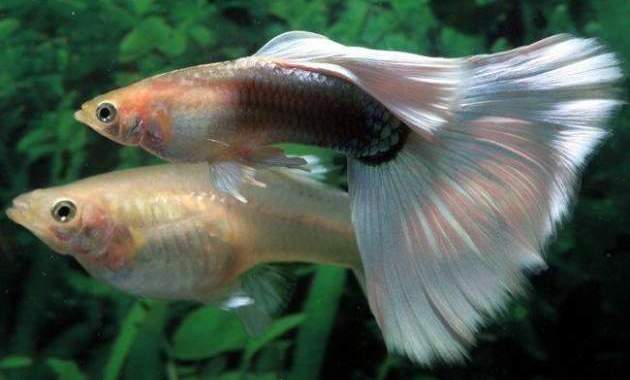
What Kind Of Algae Types Do Guppies Eat?
There are several algae that seen appear in the planted aquarium habitat; however, only a few species that guppies prefer. And it is:
Do Guppies Eat Green Hair Algae
Most livebearers, such as platies and mollies, tend to prefer the green hair algae rather than other types; Of course, guppies too.
Thread algae, string algae, or fuzz algae are other common names that are used by hobbyists to identify them. However, based on their scientific names, they can be divided into four different algae species, including spirogyra, oedogonium, cladophora, and rhizoclonium.
These filamentous algae are notorious due to their ability to grow on almost surfaces of objects in the aquarium, like on gravel, decorations, aquatic plants, aquarium equipment, and even as floating stuff.
They are really easy to reproduce themselves, thrive well in the young or mature aquarium, and are pretty robust to wipe out. Fortunately, the existence of guppies can rescue your aquarium from this plague.
Do Guppies Can Eat Staghorn Algae?
The staghorn algae are a member of red algae, which only a few fish are willing to nibble on. Luckily, guppy fish is one of them. However, guppies tend to pick young or dead staghorn algae because they are tough and contain fewer nutrients.
You can use flourish excel to kill them; then, the guppy cleans up the remains. This treatment is fit for other types of freshwater aquarium algae. The weaker algae are easy to consume; you should remove the leftover using gravel cleaner or other tools in order to prevent another complex problem.
Do Guppies Can Eat Black Beard Algae?
Just like staghorn algae, the black beard algae belong to the red algae group too. They are also called black brush algae and grow like a fuzzy black or gray beard sticking on the edge of aquarium objects.
If you leave them without treatment, they can cover your tank entirely just in a few days. BBA is a nuisance, and sadly only little of aquatic species will be readily eating them.
Guppy love feeding BBA but do not remove them completely because these algae spread rapidly, and the fish only nibble on small pieces. So, relying on guppies to handle their growth is probably not work.
Do Guppies Can Eat Brown Algae?
Brown algae are not sticking firmly on the objects’ surface and have a gentle texture. It makes them pretty easy to remove, which makes them a perfect snack for guppy fish.
Guppies might eat algae bit by bit, so you should add some advanced partners such as siamese algae eaters. The combination of them will result in a significant effect. Most guppies fry does not eat brown algae, staghorn algae, and black beard algae.
Do Guppies Eat Algae Wafers?
Yes, they will be happy to feed on wafers algae-based. This commercial fish food is available in most local pet shops and online trades. It is formulated for bottom-dwelling fish such as loach and pleco; however, guppies can feed on it to get energy.
They also accept similar food types such as pellets, flakes, and spirulina tablets. On the contrary, they gladly feed on blanched vegetables such as lettuce, zucchini, kale, and cabbage. Frozen and live food like bloodworms, brine shrimps, daphnia, and tubifex worms is the best food types for guppies.
Keep in your mind, do not overfeed your guppies. It leads to many worst problems, including algae. The organic waste that guppies release and decomposing of plant matter combine with the decaying of leftover food, giving a chance for algae to bloom well and reducing water quality.
Do Guppies Eat Aquarium Parasites?
Some weird creatures that are developed in the planted tanks might cause a negative effect on the aquarium ecosystem. Planaria, detritus worm, and hydra is a bad parasite that was banned from the aquarist’s tank long ago to arise. Happily, guppies are excited to hunt these horrible strangers. Instead, they provide high proteins than algae.
Can The Real Algae Eaters Keep Alongside With Guppies?
It is definitely yes; adding some algae eaters with guppy would create many benefits for your aquascape tank. Guppies can not quickly clean up the algae numbers, so they need a couple of tankmates to help them exterminate this outbreak.
You can put some money to buy suitable algae eaters for guppies’ tankmates, that is:
- Siamese algae eater (SAE)
- Chinese algae eater (CAE)
- Bulldog pleco
- Pitbull pleco
- Bristlenose plecos
- Ramshorn snails
- Apple snails
- Rabbit snails
- Nerite snails
- Malaysian trumpet snails
- Otocinclus catfish
- Siamese flying fox
- Twig catfish
- Whiptail catfish
Why do we not add shrimps to this list? Because there is a possibility that guppies can eat smaller shrimps, especially the shrimplet. They often hunt microcrustaceans such as tiny gammarus and shrimp babies in the wild.
Well, we do not advise adding guppies to shrimptank or vice versa. Even more, if you frequently leave your tank or forget to feed them for quite a long time. It just makes your poor shrimp suffer.
Can Guppies Live In The Brackish Or Saltwater?
The answer to this question depends on how you represent the saltwater itself. Every marine environment has different salinity levels, and these fish can not live in all of them. For your information, guppies normally tolerate water salinity levels of up to 58.5%. The higher level of it would make them hurt and even dead.
You can not suddenly move them from topical water to brackish or even marine environment. The guppies might be dehydrated and even die in an environment with optimal salinity rates if the transition is too fast. Here, we need a process called the acclimation period to help them adapt to the new environments gradually.
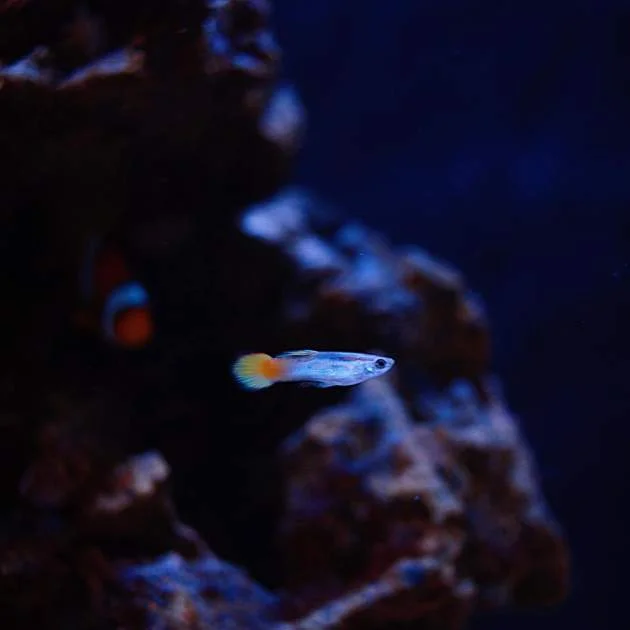
Can Guppies Live In The Marine Aquarium?
Yes, there are; you keep them in your favorite reef or coral tank since the maximum salinity level is around 150% of normal seawater (58.5%). Ensure your marine tank’s salinity level does not exceed the maximum toleration rates.
Guppy fish will help your saltwater algae eaters to beat any algae clumps that develop inside your aquarium. Besides, they also allow you to against any tiny parasite that presents.
How To Acclimate Guppies To Saltwater Condition
If you search on the internet, you will see many different types to acclimate them. Start from a simple way that just falls down them into a marine aquarium at once, until to some methods that require many steps and much time.
At this time, we use a drip acclimation method which does not require too many materials. You can read this in the last section of the article “Do Really Mollies Can Eat Algae That Thrive In Freshwater And Saltwater Aquarium?.”

